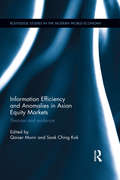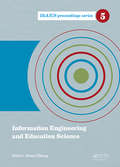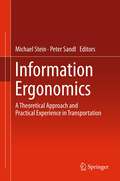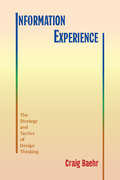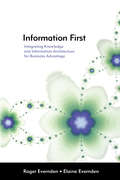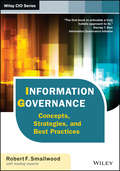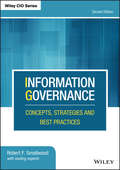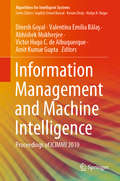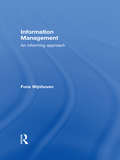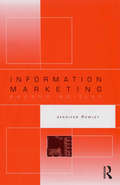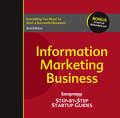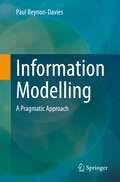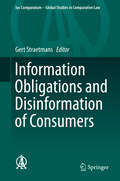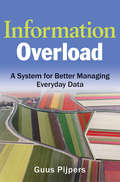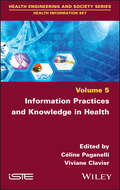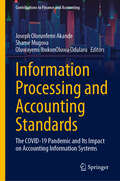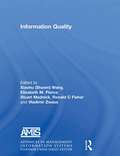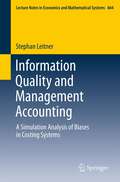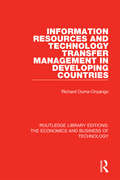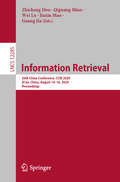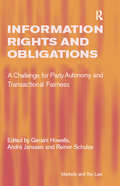- Table View
- List View
Information Efficiency and Anomalies in Asian Equity Markets: Theories and evidence (Routledge Studies in the Modern World Economy)
by Qaiser Munir Sook Ching KokThe efficient market hypothesis (EMH) maintains that all relevant information is fully and immediately reflected in stock prices and that investors will obtain an equilibrium rate of return. The EMH has far reaching implications for capital allocation, stock price prediction, and the effectiveness of specific trading strategies. Equity market anomalies reflect that the market is inefficient and hence, contradicts the EMH. This book gathers both theoretical and practical perspectives, by including research issues, methodological approaches, practical case studies, uses of new policy and other points of view related to equity market efficiency to help address the future challenges facing the global equity markets and economies. Information Efficiency and Anomalies in Asian Equity Markets: Theories and evidence is an insightful resource that will be useful for students, academics and professionals alike.
Information Engineering and Education Science: Proceedings of the International Conference on Information Engineering and Education Science (ICIEES 2014), Tianjin, China, 12-13 June, 2014 (IRAICS Proceedings)
by Dawei ZhengThis proceedings volume contains selected papers presented at the 2014 International Conference on Information Engineering and Education Science (ICIEES 2014), held June 12-13 in Hong Kong, China. The objective of ICIEES 2014 was to provide a platform for researchers, engineers, academics as well as industry professionals from all over the world to
Information Ergonomics: A theoretical approach and practical experience in transportation
by Michael Stein Peter SandlThe variety and increasing availability of hypermedia information systems, which are used in stationary applications like operators' consoles as well as mobile systems, e.g. driver information and navigation systems in automobiles form a foundation for the mediatization of the society. From the human engineering point of view this development and the ensuing increased importance of information systems for economic and private needs require careful deliberation of the derivation and application of ergonomics methods particularly in the field of information systems. This book consists of two closely intertwined parts. The first, theoretical part defines the concept of an information system, followed by an explanation of action regulation as well as cognitive theories to describe man information system interaction. A comprehensive description of information ergonomics concludes the theoretical approach. In the second, practically oriented part of this book authors from industry as well as from academic institutes illustrate the variety of current information systems taken from different fields of transportation, i.e. aviation, automotive, and railroad. The reader thus gains an overview of various applications and their context of use as well as similarities and differences in design. This does not only include a description of the different information systems but also places them in the context of the theories and models, which were presented in the first part of this book.
Information Executives Truly Need
by Peter F. DruckerThe ability to gather, arrange, and manipulate information with computers has given business people new tools for managing. But data processing tools have done more than simply enable executives to do the same tasks better. They have changed the very concepts of what a business is and what managing means. To manage in the future, executives will need an information system integrated with strategy, rather than individual tools that so far have been used largely to record the past. The executive's tool kit has four kinds of diagnostic information: foundation information, productivity information, competence information, and resource-allocation information. The sources of the information are so diverse, and sifting through and interpreting it for a specific business are so difficult, that even small companies will need help from data specialists.
Information Experience: The Strategy and Tactics of Design Thinking (SUNY series, Studies in Technical Communication)
by Craig BaehrInformation isn't simply read or used, rather it creates a holistic experience for users.Information Experience provides a usable framework for developing information products and design thinking practices for a wide range of projects, including application development, content creation, instructional materials, and user experience design. Whether content is created by human, machine, or artificial intelligence, memorable information experiences begin with the user, encompassing how user research, content development strategies, and design tactics fit together in creating engaging information experiences and products. The book provides an in-depth discussion of the components of information experience, including user perception, cognition, environment design, strategic branding, and tactical design. Collectively, these elements provide a foundation for understanding how information products function on a level beyond utility, as holistic and immersive experiences for users.
Information First: Integrating Knowledge And Information Architecture For Business Advantage
by Elaine Evernden Roger EverndenInformation is seriously undervalued and underused as a corporate resource. The pressures of global competition and a growing dependence on information technology mean that the effective use of information is more important now than it has ever been. This book is a fundamental guide for unleashing information potential, by combining the discipline of information architecture with the power of knowledge management, to drive organizational changes.Instead of unlocking the potential of information, people are drowning in detail. Current books only approach this subject from an information technology perspective. This book combines techniques from knowledge management and information architecture to provide a layer above the detail - techniques for seeing the big picture.
Information Governance
by Robert F. SmallwoodProven and emerging strategies for addressing document and records management risk within the framework of information governance principles and best practicesInformation Governance (IG) is a rapidly emerging "super discipline" and is now being applied to electronic document and records management, email, social media, cloud computing, mobile computing, and, in fact, the management and output of information organization-wide. IG leverages information technologies to enforce policies, procedures and controls to manage information risk in compliance with legal and litigation demands, external regulatory requirements, and internal governance objectives. Information Governance: Concepts, Strategies, and Best Practices reveals how, and why, to utilize IG and leverage information technologies to control, monitor, and enforce information access and security policies.Written by one of the most recognized and published experts on information governance, including specialization in e-document security and electronic records managementProvides big picture guidance on the imperative for information governance and best practice guidance on electronic document and records managementCrucial advice and insights for compliance and risk managers, operations managers, corporate counsel, corporate records managers, legal administrators, information technology managers, archivists, knowledge managers, and information governance professionalsIG sets the policies that control and manage the use of organizational information, including social media, mobile computing, cloud computing, email, instant messaging, and the use of e-documents and records. This extends to e-discovery planning and preparation. Information Governance: Concepts, Strategies, and Best Practices provides step-by-step guidance for developing information governance strategies and practices to manage risk in the use of electronic business documents and records.
Information Governance for Healthcare Professionals: A Practical Approach (HIMSS Book Series)
by Robert F. SmallwoodLike other critical organizational assets, information is a strategic asset that requires high level of oversight in order to be able to effectively use it for organizational decision-making, performance improvement, cost management, and risk mitigation. Adopting an information governance program shows a healthcare organization’s commitment to managing its information as a valued strategic asset. Information governance serves the dual purpose of optimizing the ability to extract clinical and business value from healthcare information while meeting compliance needs and mitigating risk. Healthcare organizations that have information governance programs will have a competitive edge over others and contributes to safety and quality of care, population health, operational efficiency and effectiveness, and cost reduction initiatives. This is a much-needed book in the healthcare market space. It will explain, in clear terms, how to develop, launch, and oversee an Information Governance program. It also provides advice and insights from leading IG, cybersecurity and information privacy professionals in healthcare.
Information Governance: Concepts, Strategies and Best Practices (Wiley CIO)
by Robert F. SmallwoodThe essential guide to effective IG strategy and practice Information Governance is a highly practical and deeply informative handbook for the implementation of effective Information Governance (IG) procedures and strategies. A critical facet of any mid- to large-sized company, this “super-discipline” has expanded to cover the management and output of information across the entire organization; from email, social media, and cloud computing to electronic records and documents, the IG umbrella now covers nearly every aspect of your business. As more and more everyday business is conducted electronically, the need for robust internal management and compliance grows accordingly. This book offers big-picture guidance on effective IG, with particular emphasis on document and records management best practices. Step-by-step strategy development guidance is backed by expert insight and crucial advice from a leading authority in the field. This new second edition has been updated to align with the latest practices and regulations, providing an up-to-date understanding of critical IG concepts and practices. Explore the many controls and strategies under the IG umbrella Understand why a dedicated IG function is needed in today’s organizations Adopt accepted best practices that manage risk in the use of electronic documents and data Learn how IG and IT technologies are used to control, monitor, and enforce information access and security policy IG strategy must cover legal demands and external regulatory requirements as well as internal governance objectives; integrating such a broad spectrum of demands into workable policy requires a deep understanding of key concepts and technologies, as well as a clear familiarity with the most current iterations of various requirements. Information Governance distills the best of IG into a primer for effective action.
Information Management and Machine Intelligence: Proceedings of ICIMMI 2019 (Algorithms for Intelligent Systems)
by Abhishek Mukherjee Amit Kumar Gupta Dinesh Goyal Valentina Emilia Bălaş Victor Hugo C. de AlbuquerqueThis book features selected papers presented at the International Conference on Information Management and Machine Intelligence (ICIMMI 2019), held at the Poornima Institute of Engineering & Technology, Jaipur, Rajasthan, India, on December 14–15, 2019. It covers a range of topics, including data analytics; AI; machine and deep learning; information management, security, processing techniques and interpretation; applications of artificial intelligence in soft computing and pattern recognition; cloud-based applications for machine learning; application of IoT in power distribution systems; as well as wireless sensor networks and adaptive wireless communication.
Information Management: An Informing Approach
by Fons WijnhovenInformation and its management is central to modern society. Organizations – private and public, national and international – have recognized that information is a key resource and that its management is critical for success. Existing books on information management focus on the abilities of computers to process data, the development of information systems, and the management of IT resources. They often start with the computer as a key issue. Although Information Management acknowledges the importance of computers and data communication, it starts from a deeper understanding of the concepts of information and knowledge, and on the basis of this understanding, derives methods to use computers effectively. This textbook provides graduates of any discipline with an understanding of the theory and practice that underpins information management, and introduces students to the concepts and applications of information management techniques in a variety of organizational contexts. In giving students strong philosophical foundations, Fons Wijnhoven's book will prove to be an excellent primer in information management.
Information Marketing
by Jennifer RowleyThe nature of the information marketplace is under continual evolution and all organisations in the information industry need to form new strategic alliances, identify new market segments and evolve new products, employing a full armoury of marketing tactics to succeed in the changing environment. In this fully revised second edition of Information Marketing Jenny Rowley explores the impact of globalization, digitization, connectivity and customization in the information marketplace. She introduces a number of new topics and a shift of emphasis which reflect both the changing nature of information services and also practical and theoretical perspectives on marketing. As well as being thoroughly revised and updated, themes that are more fully developed include: e-service, self-service, customer relationships, online branding, online marketing communications, measuring online activity and customer relationship management systems. This book's unique perspective makes it essential reading for professionals in information services as well as students in information management, library and information studies, business information, marketing, e-commerce and communication studies.
Information Marketing Business
by Entrepreneur MagazineStart Your Own Information Marketing Business 2EA six-figure income from information? Yes! It sounds easy because it is. You've got information that millions of others are looking for and now you can learn how to package, price and sell it.The experts at Entrepreneur take you step by step, jumpstarting your thinking about your area of expertise and showing you how to convert it into a high-demand information product. Following the example set by today's most successful information marketers, you learn the ins and outs of running your own information marketing business using proven strategies and effective marketing techniques. Whether looking for a side business or a full-time venture-information marketing is a flexible, lucrative business that you can start any time, and everything you need is right here.This kit includes: Essential industry and business-specific startup steps with worksheets, calculators, checklists and more. Entrepreneur Editors' Start Your Own Business, a guide to starting any business and surviving the first three years. Downloadable, customizable business letters, sales letters, and other sample documents Entrepreneur's Small Business Legal Toolkit.
Information Modelling: A Pragmatic Approach
by Paul Beynon-DaviesThis textbook provides solid guidance on how to produce information models in practice. Information modeling has become increasingly relevant as an approach for understanding the active role that data plays within business and management and promoting the planning of business activities. The text promotes a practical approach to information modelling based around the analysis of communicative practice within delimited domains of organization. The book chapters are designed to be read in sequence. The early chapters build an account of information modelling from the bedrock of a theory of information situations. Later chapters discuss a number of practical issues concerned with the application of this business analysis and design technique. The conclusion demonstrates a larger context for the application and importance of information modelling. Numerous in-text examples of the concepts of information modelling and their application are included throughout the text. A separate chapter is devoted to a range of exercises which the reader can use to test understanding and application of the technique. An appendix with solutions is also provided to support learning. Overall, this textbook provides a step-by-step introduction to information modelling for use in undergraduate and postgraduate modules in information systems, computer science and even digitally focused modules within business and management. No prerequisite knowledge is assumed on the part of the reader. Students and practitioners are tutored in the development of information modelling from first principles. The book covers all the core principles of both entity-relationship diagramming and class diagramming – the two major approaches to information modelling.
Information Obligations and Disinformation of Consumers (Ius Comparatum - Global Studies in Comparative Law #33)
by Gert StraetmansThis book focuses on recent developments in consumer law, specifically addressing mandatory disclosures and the topical problem of information overload. It provides a comparative analysis based on national reports from countries with common law and civil law traditions in Asia, America and Europe, and presents the reports in the form of chapters that have been drafted on the basis of a questionnaire, and which use the same structure as the questionnaire to allow them to be easily compared. The book starts with an analysis of the basic assumptions underlying the current consumer protection models and examines whether and how consumer models adapt to the new market conditions. The second part addresses the information obligations themselves, first highlighting the differences in the reported countries before narrowing the analysis down to countries with a general pre-contractual information duty, particularly the transparency requirements that often come with such a duty. The next part examines recent developments in the law on food labelling, commercial practices and unfair contract terms in order to identify whether similar traits can be found in European and non-European jurisdictions. The fourth part of the book focuses on specific information obligations in the financial services and e-commerce sectors, discussing the fact that legislators are experimenting with different forms of summary disclosures in these sectors. The final part provides a critical appraisal of the recent developments in consumer information obligations, addressing the question of whether the multiple criticisms from behavioural sciences necessitate abandonment or refinement of current consumer information models in favour of new, more adequate forms of consumer protection, and providing suggestions.
Information Overload
by Guus PijpersWorld-class guidance on using information to achieve better performance Examining the characteristics of information and the latest findings in cognitive science, this book shows how the mind works, how it can be used to think optimally about your business, and how to improve business performance with better information management practices. Provides the process and tools necessary to identify this information and how to remember it, and how to better use the people around you to obtain the best information Reveals how to handle all of the hundreds of pieces of information received daily Provides case studies as well as checklists that show managers how to implement the methodology presented in the book Innovative and ahead of its time, this book helps you take control of all the information that enters your life, get better informed, and have more time for the important issues you face within your business.
Information Policy: How to Factor in a Government's Role and Goals
by Hal R. Varian Carl ShapiroBy and large, the information sector continues to operate under long-standing rules of engagement designed for an entire economy. This chapter lays out the principles of competition policy and government intervention, identifies areas where the old rules have proven inadequate, and suggests changes that would ensure that governments support, rather than impede, the growth of the information economy.
Information Practices and Knowledge in Health
by Viviane Clavier Céline PaganelliIn the field of health, information practices and the organization of knowledge constitute a major challenge today. The practices of the medical profession, or of patients, are evolving under the influence of digital technology. At the same time, the way in which medical knowledge is organized, represented and mediated is also evolving.Information Practices and Knowledge in Health addresses the different aspects of the field of specialized medical and health information; it focuses on the informational practices of professionals in the sector, of patients and, more broadly, of citizens with regards to their health. This book also considers the systems that are used for organizing knowledge in this field.
Information Privacy in the Evolving Healthcare Environment (HIMSS Book Series)
by Linda KoontzAdvances in health information technology (health IT) have the potential to improve the quality of healthcare, to increase the availability of health information for treatment, and to implement safeguards that cannot be applied easily or cost-effectively to paper-based health records. However, the digitization of health information is also raising new privacy risks and concerns. Sensitive health information in digital form is more easily aggregated, used, and shared. In addition, the rising cost of healthcare and the search for efficiency may create incentives to use the information in new ways. Research has consistently shown that while the public sees the potential value of health information exchange and technological advancements, it remains gravely concerned about the privacy of their sensitive health information. As a result, it is becoming increasingly clear that ensuring public trust will be critical to the successful implementation of nationwide health information exchange. The purpose of this second edition is two-fold: 1) to educate readers about privacy concepts and 2) highlight key privacy issues facing the nation and the healthcare community as it moves towards electronic health records and health information exchange. The first three chapters are descriptive in nature, defining privacy and distinguishing it from security, defining the complex legal landscape for health information privacy, and setting the stage for the following chapters by describing the current landscape of the evolving healthcare environment. The following chapters discuss specific privacy issues and challenges in detail. The book concludes with a chapter providing a view to the future of healthcare and the association privacy implications. This is an updated version of one of HIMSS’ best-selling books on information privacy.
Information Processing and Accounting Standards: The COVID-19 Pandemic and Its Impact on Accounting Information Systems (Contributions to Finance and Accounting)
by Shame Mugova Joseph Olorunfemi Akande Oluwayemi IbukunOluwa OdularuThis book addresses challenges caused by COVID-19 crisis on financial reporting and information management systems. Information access, transmission and rapid changes in the operating environment revealed inadequacies of international financial reporting standards. Accounting and information are critical elements for business success. While accounting processes financial information and more often guided by standards, information sciences bothers on having access to the right information. Crisis overtime has exposed the weaknesses and/or limitations of these important ingredients of business. The recent pandemic created different challenges and revealed the inadequacies of several accounting and information systems processes. The dynamics of planned business restructuring activities introduced lots of considerations culminated to additional disclosure for business tax purposes. The volume combines perspectives and research from academics and practitioners from the industry on modifying accounting systems and processes to be resilient in and out of crisis. The chapters in the book highlight recommendations to standards and information system improvement.
Information Quality (Advances In Management Information Systems Ser.)
by Richard Y. Wang Elizabeth M. Pierce Stuart E. Madnick Craig W. FisherOrganizations today have access to vast stores of data that come in a wide variety of forms and may be stored in places ranging from file cabinets to databases, and from library shelves to the Internet. The enormous growth in the quantity of data, however, has brought with it growing problems with the quality of information, further complicated by the struggles many organizations are experiencing as they try to improve their systems for knowledge management and organizational memory. Failure to manage information properly, or inaccurate data, costs businesses billions of dollars each year. This volume presents cutting-edge research on information quality. Part I seeks to understand how data can be measured and evaluated for quality. Part II deals with the problem of ensuring quality while processing data into information a company can use. Part III presents case studies, while Part IV explores organizational issues related to information quality. Part V addresses issues in information quality education.
Information Quality and Management Accounting: A Simulation Analysis of Biases in Costing Systems
by Stephan LeitnerOne of the main aims of management accounting is to provide managers with accurate information in order to provide a good basis for decision-making. There is evidence that the information provided by management accounting systems (MAS) is distorted and the occurrence of biases in accounting information is widely accepted among users of MAS. At the same time, the intensity and the frequency of use of MAS increase, too. Consequently, the quality of the provided information is critical. The focus of this simulation study is twofold. On the one hand, the impact of the sophistication of traditional costing systems on error propagation in the case of a set of input biases is investigated. On the other hand, the impact of single and multiple input biases on the quality of the information provided by traditional costing systems is focused. In order to investigate the research questions, a simulation approach is applied.
Information Resources and Technology Transfer Management in Developing Countries (Routledge Library Editions: The Economics and Business of Technology #34)
by Richard OnyangoOriginally published in 1997, this book puts information management in the context of technology transfer, industrialization and national development. As well as showing the necessity for the efficient use of information resources, the book also examines the costs of poor information management in undermining negotiation, the preparation of contingencies and the ability to let go of 'dead projects'. The book includes case studies of two technology transfer projects in Kenya are included.
Information Retrieval: 26th China Conference, CCIR 2020, Xi'an, China, August 14–16, 2020, Proceedings (Lecture Notes in Computer Science #12285)
by Wei Lu Zhicheng Dou Qiguang Miao Jiaxin Mao Guang JiaThis book constitutes the refereed proceedings of the 26th China Conference on Information Retrieval, CCIR 2020, held in Xi'an, China, in August 2020.*The 12 full papers presented were carefully reviewed and selected from 102 submissions. The papers are organized in topical sections: search and recommendation, NLP for IR, and IR in finance. * Due to the COVID-19 pandemic the conference was held online supplemented with local on-site events.
Information Rights and Obligations: A Challenge for Party Autonomy and Transactional Fairness (Markets and the Law)
by André JanssenInformation requirements have become a key element of consumer policy at the European level and are also gaining increasing importance in all other areas of private law. The law stipulates that information provided should not be misleading and also involves requirements regarding the fairness and objectivity of what has been provided. In addition to controlling the veracity of what is voluntarily offered by traders, the law increasingly requires disclosure of certain information. This volume focuses especially on the question of how these information requirements influence the party autonomy. International contributors explore in various contexts whether the legislative policy regarding the information requirements and their relationship to party autonomy has been properly thought through.
